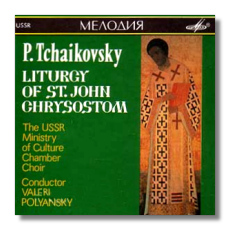
The Internet's Premier Classical Music Source
Related Links
- Tchaikovsky Reviews
- Latest Reviews
- More Reviews
-
By Composer
-
Collections
DVD & Blu-ray
Books
Concert Reviews
Articles/Interviews
Software
Audio
Search Amazon
Recommended Links
Site News
 CD Review
CD Review
Piotr Ilyitch Tchaikovsky

Liturgy of St. John Chrysostom, Op. 41 (1878)
USSR Ministry of Culture Chamber Choir/Valery Polyansky
Melodiya SUCD 10-00014 53:47 DDD
Available on Moscow Studio Archives 18402
Amazon
- UK
- Germany
- Canada
- France
- Japan
- CD Universe
The liturgical compositions of Russian composers are still virtually unknown in the West. Rachmaninoff's Vespers has just about managed to creep out of the silence, though his Liturgy of St. John Chrysostom remains virtually unknown. Gretchaninov's choral works gather dust. And one of Tchaikovsky's supreme masterpieces, his own setting of the Liturgy of St. John Chrysostom, has hardly troubled the musical consciences of his thousands of admirers, perhaps because its very Russian-ness - this is not the Tchaikovsky of the perennial favourites. Yet it is unarguably essential Tchaikovsky, and it's the work of his that moves me beyond all others.
Like the Rachmaninoff, Tchaikovsky's Liturgy of St. John Chrysostom was archaic even when it was written, in 1878 (at the same time as Eugene Onegin). Its tone is very obviously that of Old Russia, and has much the same relation to Russia's musical past as, say, Vaughan Williams' church music has to England's. The music, in fifteen short sections, ranges from the magnificent choral sweep that begins the work, to moments of rapt, still intensity. And for all the deliberate antiquity of the style, there are on occasion striking moments of what might appear musical modernism (there are, for example, some biting dissonances) but which, in fact, anchor the music all the more firmly in the past: if Vaughan Williams evokes the sixteenth century, Tchaikovsky's references are directly late-mediaeval. He accordingly has nothing to do with anything so anachronistic as tunes: the music moves great slabs of sound based on chant. One of the few concessions to "modern" compositional technique is the fugue in the penultimate section - and that a fugue, an archetypically archaising musical device, can sound "modern" tells you a lot about the context in which this one finds itself. The score as a whole is a huge edifice of sound: although at no point does it come to meet the listener in the way that Tchaikovsky's other works can do, it is nonetheless deeply moving, and as profound as anything he composed.
The performance is of the first order: even under Soviet rule, Russian choirs were among the best in the world, and this one, recorded in (it seems) 1990, is outstandingly good. The recording was made in the ideally suited acoustic of the Cathedral of Dormition in Smolensk, in whose massive interior Tchaikovsky's massive conception can be heard reverberating into the distance. This is, in short, one of the finest recordings and performances of any piece of music I have come across for a long time.
Copyright © 1993/1996, Martin Anderson


















